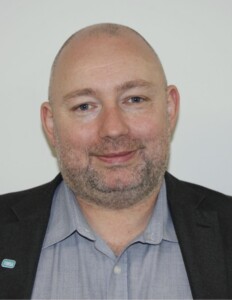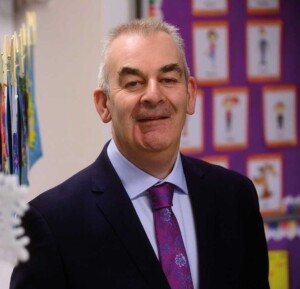Dublin’s special education crisis: The unions speak
Dublin People 02 Apr 2025
Dublin’s special education system is at breaking point.

Parents, teachers, and support staff are sounding the alarm as schools struggle with chronic understaffing, insufficient resources, and an ever-growing demand for places.
In this latest installment of our in-depth investigation, we speak to representatives from Fórsa, a trade union that represents approximately 12,000 Special Needs Assistants (SNAs), and The Irish National Teachers’ Organisation (INTO).

Shane Lambert, Fórsa Assistant General Secretary responsible for the four SNA branches, the School Caretakers branch and the School Secretaries branch.
How do your members feel regarding the challenges and problems in special education at the moment?
Our members are on the coal face when it comes to the issues and problems in special education.
They sit shoulder to shoulder with the children in their classes every day and get a unique and heartfelt perspective of the children and the landscape of Special Education overall.
They build strong bonds with the children in their care and these means that they see the issues from a multitude of different perspectives, their own as a professional, often as a parent also, through the eyes of the child etc.
On that basis the issues become far more pronounced and can lead to frustrations from our members when they see injustices, negative practices or failings in the system.
Many SNAs will work with children on a daily basis and know that the child is not able to obtain the support they need.
Whether this be diagnosis, or therapeutic intervention, our SNAs see the on the ground effect that they will have on a child and their families.
Significant waiting lists for diagnosis, in most cases spanning years.
This can mean support will not be provided in the event the needs may be somewhat understated or opaque, or if support is provided it may not be exactly what the child needs, given there is a lack of clarity on the needs in the absence of an assessment.
In a similar vein, the lack of health and social care professionals in specific therapeutic grades leads to children who may have a diagnosis and a clearly defined support plan, being unable to obtain the supports they need, as the therapists are not there to provide them.
There are significant waiting lists for Occupational, Speech and Language therapists and across the health system in areas such as CAMHS, children’s psychology etc.
The fact that our health service is struggling with gaps and staffing and unfilled vacancies has a profound effect on the education system and the children within it, this can lead to issues in the classroom where children either cannot participate to their full potential on foot of the lack of support, or they become distant or frustrated, because they are not being supported to achieve their full potential.
The SNA role is an extremely challenging role and whilst it is rewarding, seeing such issues and the effects of them on the children in their care can lead to significant frustration, in particular when they see the wealth that is in the country and the slow pace of change.
An example of this would when reports issue from various stakeholders (such as the National Council for Special Education NCSE, or management bodies) which contain recommendations that make sense to the union and its members, but the implementation of such recommendations may never happen, or only happens in part and the pace of change is extremely slow.
Past recommendations for the inclusion of a nursing support service in schools or having multi-disciplinary / cross sectoral teams in place to support both the children and our members, have struggled on foot of issues such as recruitment and retention in the health service.
I think in more recent years members would acknowledge that there would appear to be a stronger appetite from the likes of the Department and the NCSE to make improvements in the sector and there is significant engagement underway to try and achieve that and it looks like there may be some very positive changes on the horizon but it has been a long process and there is real concern about how much investment the government will put into special education, to achieve real change.
So, in conclusion I would say that there is a definite frustration and maybe a growing impatience for members to see real tangible change on the ground, combined with a cautious optimism and real anger at the lack of supports and extensive waiting lists from the health side.
Has Forsa noticed any difference between how SNAs are treated nowadays as opposed to how they were treated 10 years ago? Are things improving?
The short answer here would be yes, but it does not mean that problems don’t exist in areas and there is still work to be done on certain mindsets.
We have definitely seen an improvement in the type of consultation and engagement we have had centrally with the Department, the respective ministers, education colleagues such as management bodies and external stakeholders such as the NCSE.
I think it would be fair to say there is a greater collaboration and understanding between all, of what the issues are and what we want to achieve, though there may be differences in opinion on how we get there,
There is a definite change and a clear narrative by all parties to ensure that the SNAs are valued and receive the respect they deserve whilst being recognised for the very complex role they hold.
However, the proof of this will really be in the outcomes to the discussions that are currently underway and due to finish in June, with a report of recommendations to issue following.
So really whilst it has been positive in terms of narrative and discussion, it will be the actions and recommendations that will make the minds of our members up.
They need to see and feel change, not just hear about it.
This is a cohort of staff whose minimum qualification remains set at 3 D passes in the junior certificate or equivalent and has not been updated since the late 70’s, there are still glaring discrepancies between some of the terms of conditions that SNAs get in comparison to other civil and public servants, including teaching colleagues, so for them the measure of change and the intent will be in those decisions and whether or not, they will be treated fairly and equally, respect and recognition needs to be shown and afforded, not just said in words.
Do you feel the State is doing enough to sort this crisis out?
We do believe that significant efforts are being made by the likes of the Department of Education, the NCSE and other school stakeholders to make changes and improvements.
We also believe there needs to be greater use of article 37A to compel schools to open more spaces for children with additional needs, this will help ensure greater access to school places across the entire country but it is only 1 strand, and it needs to be backed up by resources, both in terms of staffing resources but also clear guidance on how to go about opening a special class and the appropriate supports for school leaders in doing so also, it can’t be done in half measures.
We believe that any child should have the right to be educated in a school of their choosing, alongside their friends and siblings, without the need to have to travel great distances, but we also believe the state needs to ensure that correct supports are made available to that child to enable them to achieve their full potential and be part of an inclusive education environment that is real and meaningful.
Schools and school leaders also need supports to enable this to happen in a way that meets the standards that we all want to achieve to make our education system a world class system that is inclusive and easy to access for all children.
What solutions, if any, are needed to fix this crisis?
We believe that in conjunction with the above, the contract review needs to deliver real change for SNAs, this would mean a redeployment scheme for them so that they have job-security but more importantly their knowledge and experience is guarded in the system.
The current situation means that if a need for SNA support in a particular school is reduced (maybe the child moves location or progresses on to secondary), then the SNA who has the least amount of service can either have their hours cut, or their position made redundant.
They may go through a system where they get priority in terms of interview for a post in another school, but there is no mechanism to transfer the SNA seamlessly from one school to another, even though there may be an SNA post required in a school nearby and that SNA will have the skills and hands on experience to fill that post.
Putting redeployment panel in place will mean that SNAs who have skills and hands on experience who are at risk of losing their role in their school, can seamlessly move to another school without the need to interview, bringing that experience with them.
This is a huge benefit for the sector (as we guard skills, experience, and investment), for the exchequer (because a redundancy may be guarded), for the SNA (who gets job security) and more importantly for the child who needs the support.
We also need to see the minimum qualification raised to a level that appropriately acknowledges the complexity of the SNA role and reflects the level of responsibility, a proper cohesive training programme be put in place for those who wish to become SNAs, along with move from the current scheme model, to a proper professional service, with continuous professional development and career opportunities for SNAs within their field.
As at the minute there is nowhere for an SNA to gain promotion and remain in their field doing the work they do, they must move elsewhere.
We need to continue to change mindsets ensuring that SNAs are assigned appropriately and given the professional respect and recognition they deserve, whilst also looking to make the role an attractive career prospect, building a greater diversity of those who carry out the role.
As said previous, there is a degree of optimism in this regard with the discussions that are ongoing, but we really need to see the conclusions of those and what they deliver.

General Secretary of the INTO, John Boyle.
How do your members feel regarding the ongoing crisis in special education?
The INTO is dedicated to inclusive education, ensuring that all children, regardless of their needs, have the opportunity to thrive.
However, teachers are being forced to bridge the gap left by inadequate resources, overcrowded classrooms, and a lack of essential external supports.
With Ireland’s average class size exceeding the EU norm, with 250,000 pupils in classes of 25 or larger and over 100,000 children on waiting lists for therapies, pupils with additional needs are being denied the support they require.
To address this crisis, the INTO is calling for a national transition framework to ensure continuity of care, a reduction in class sizes to improve learning conditions, and guaranteed substitute cover for all teacher absences.
It is unacceptable that special education teachers are being redeployed to cover staff shortages, disrupting vital support for pupils with special educational needs.
Teachers go above and beyond every day, but they cannot work alone without the interventions and supports of other medical professionals—urgent government action is needed to address these systemic failures and ensure no child is left behind due to a lack of resources or support.”
The INTO met last month with the new Minister for Education and Youth, Helen McEntee. What positives came out of that meeting?
At its meeting with the Minister, the INTO stressed the urgent need for stronger support for schools serving disadvantaged communities, advocating for a DEIS Plus scheme to provide targeted interventions, alongside expanded home-school liaison and counselling services.
Special education remains a critical concern, with many schools struggling to meet the needs of pupils due to a lack of investment.
The INTO called for increased provision of special classes, in-school therapeutic services, and greater support for children with additional needs.
More special education teachers and SNAs are essential, alongside improved training opportunities to equip staff with the skills needed to provide high-quality, inclusive education.
The government must act now to ensure that every child receives the support they need to succeed.
At our meeting with the Minister, the INTO made it clear that urgent action is needed to address the pressing challenges in education.
As we approach our Congress in Galway this Easter, we will closely examine the Minister’s initial actions in her first months in office.
Since meeting the Minister, she has opened the application process for the Summer Works scheme and announced a new professional doctorate programme in Educational Psychology.
Does the INTO feel there will be a change of attitude from the new administration?
The INTO remains committed to working collaboratively with the Department of Education and the Minister for Education and Youth, as we have for over 157 years.
Our priority is to secure the investment and support needed to strengthen primary and special education, ensuring that every child receives the high-quality learning experience they deserve.
With over 550,000 pupils attending primary and special schools each day, it is essential that the government delivers real progress to support teachers, schools, and communities in providing the best possible education for all.
What is international best practice with regard to sorting out this crisis? Are there any countries who have successfully fixed a similar crisis and what can we learn from them?
The most pressing issue is the lack of therapeutic services and wrap around care supports at school level.
More also needs to be done to support special schools who have been neglected for years.
Obviously nowhere else in the EU has the level of overcrowding in mainstream classes where children with additional needs spend the majority of time in school.
We can learn a lot from Nordic countries who approach the supporting of special education more holistically, emphasising a community approach both inside and outside of the school setting.













